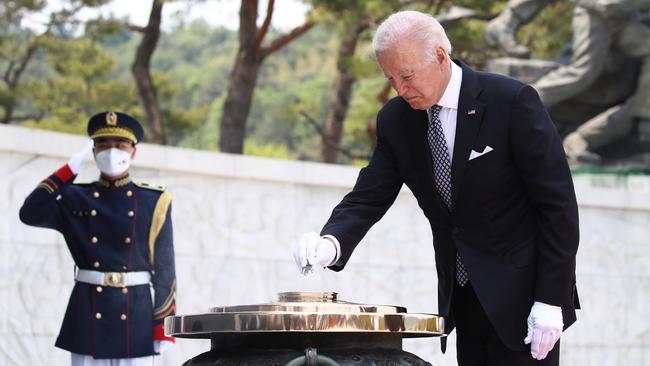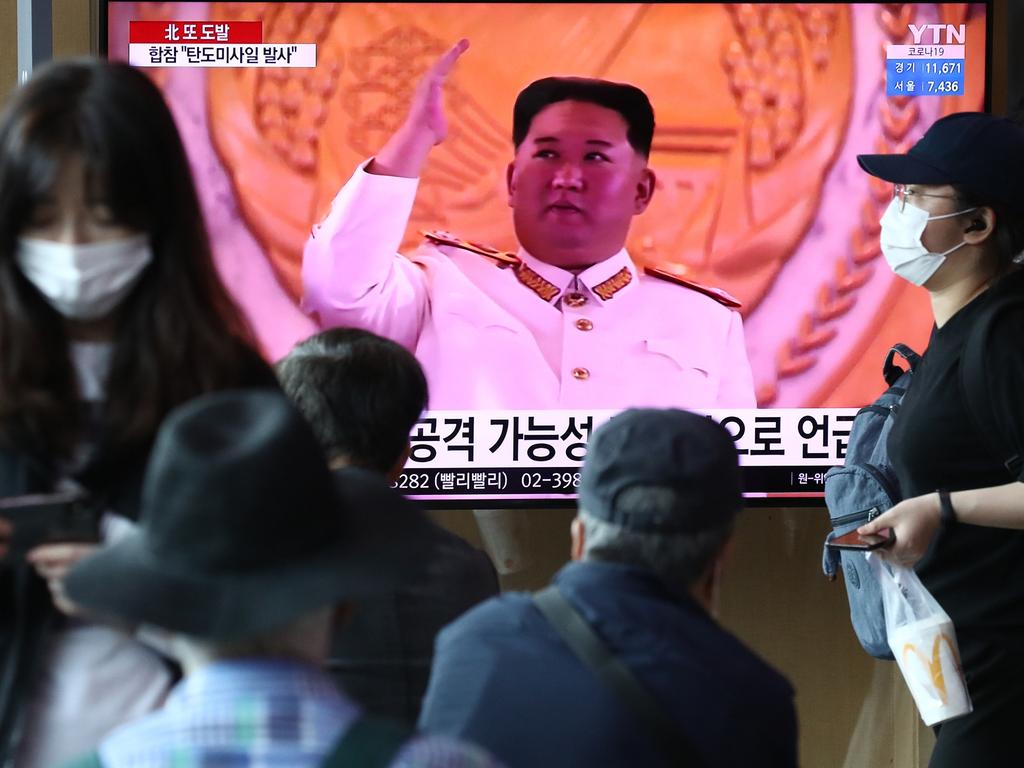Joe Biden open to meeting North Korea’s Kim Jong-un, pledges deterrence with Seoul
US, South Korean leaders say they are closely aligned after their first summit meeting.

President Joe Biden expressed openness to meeting Kim Jong-un if the North Korean leader was sincere in his intentions, even as the US and South Korea signalled plans for a stronger deterrence against Pyongyang’s accelerating weapons program.
In a joint statement after a meeting on Saturday in Seoul with new South Korean President Yoon Suk-yeol, Mr Biden said the two nations would begin discussions to expand joint military exercises as North Korea steps up missile launches and satellite images suggest preparations for its seventh nuclear test after a five-year break.
Mr Biden is making his first trip to Asia as President, a visit meant to build upon US alliances with South Korea and Japan at a time when the focus of the administration, and its European allies, has been trained on the conflict in Ukraine. He arrived in Japan late on Sunday to meet the leaders of Japan, Australia and India, who along with the US make up the Quadrilateral Security Dialogue, or the Quad.
Mr Biden said the allies would address the threat from North Korea “by further strengthening our deterrence posture and working toward a complete denuclearisation of the Korean Peninsula”.
Mr Biden said the only message he had right now for Kim would comprise a single word: “Hello. Period,” he said.
The US President and the South Korean leader held talks just 11 days after Mr Yoon took office.
Their discussions came as North Korea is reeling from a widening Covid-19 outbreak, which threatens its unvaccinated citizens. Mr Biden said he was willing to provide vaccines to North Korea but it hadn’t responded to an offer. The US was prepared to provide vaccines immediately, he said.
A White House official clarified later that the US would provide the vaccines through existing mechanisms such as Covax, a program financed mostly by Western governments to help lower-income countries. The administration had made North Korea aware of the offer the week before last, the official said, adding that the US had also offered to provide vaccines to China that could then be transferred to North Korea.
North Korea reported on Saturday around 220,000 new daily cases of people with fever, bringing the total to 2.46 million – almost 10 per cent of the population – since the first cases were reported on May 12. North Korea has previously rebuffed offers of vaccines from Covax. It has also not responded to South Korea’s offer to provide supplies, including vaccines, in light of the outbreak. But it has received medical supplies from China.
Asked on Saturday if he would have any preconditions for meeting with Mr Kim, Mr Biden said: “That would depend on whether he was sincere and whether he was serious.” White House officials have previously played down the likelihood of a meeting between Mr Biden and Mr Kim as the North Korean leader has stepped up his country’s missile tests. Mr Kim met three times with former president Donald Trump but those meetings didn’t push the North Korean leader closer to denuclearisation, with Pyongyang expanding its nuclear weapons program during the latter half of Mr Trump’s term.
North Korea has conducted more than a dozen missile tests this year, including a full-range intercontinental ballistic missile launch in March and a submarine-launched ballistic missile this month. It most recently launched three ballistic missiles on May 12. It has also conducted six nuclear tests, most recently in 2017.
US officials have warned of the possibility North Korea could conduct another nuclear or long-range ballistic missile test this month, perhaps while Mr Biden is in the region. US National Security Adviser Jake Sullivan said last week that either test would prompt the US to ramp up efforts to defend its allies and “cause adjustments to the way our military is postured in the region”.
The US is planning to use the swing through Japan to launch the Indo-Pacific Economic Framework, a pact that would allow the US to work more closely with key Asian economies on issues including supply chains, digital trade, clean energy and anti-corruption.
One of the overarching goals of the trip is to reinforce US alliances in the region in order to counter the influence of China.
US officials are divided over how and whether to lift tariffs on some $US360bn of Chinese imports. The President’s advisers are weighing what impact, if any, lifting the tariffs, put in place during the Trump administration, would have on record inflation in the US Another consideration: whether lifting tariffs opens the President up to criticism that he isn’t being tough enough on Beijing.
The Wall Street Journal




To join the conversation, please log in. Don't have an account? Register
Join the conversation, you are commenting as Logout